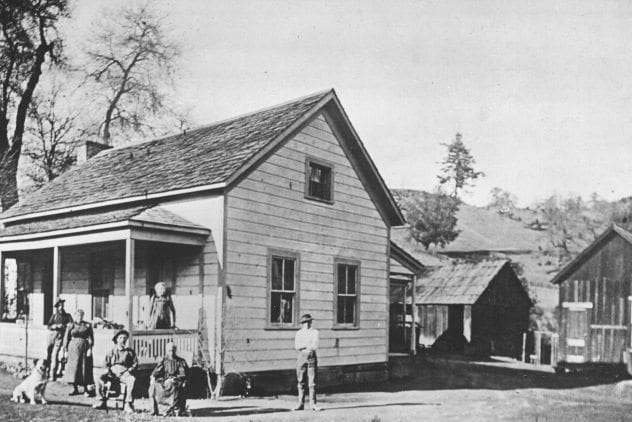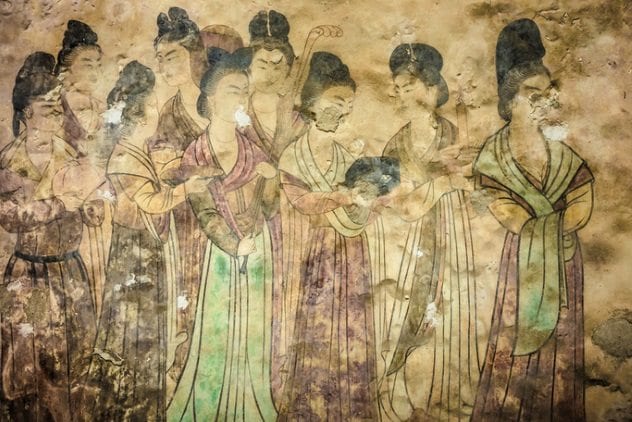 Mysteries
Mysteries  Mysteries
Mysteries  History
History 10 Surprising Stories About the Texas Rangers
 Humans
Humans 10 Philosophers Who Were Driven Mad by Their Own Theories
 Miscellaneous
Miscellaneous 10 Video-Game-Worthy Weapons and Armors from History
 Weird Stuff
Weird Stuff 10 Psychics Who Accurately Predicted Wartime Events
 The Arts
The Arts 10 Pieces of Art Inspired by a Broken Heart
 Health
Health 10 Science Fiction-Sounding New Medical Treatments
 History
History 10 Surprising Facts About the Father of Submarine Warfare
 Space
Space Ten Astonishing New Insights into Alien Worlds
 Weird Stuff
Weird Stuff 10 Bizarre Summer Solstice Rituals Still Practiced Today
 Mysteries
Mysteries Top 10 Haunting Facts About the Ghost Ship MV Alta
 History
History 10 Surprising Stories About the Texas Rangers
 Humans
Humans 10 Philosophers Who Were Driven Mad by Their Own Theories
Who's Behind Listverse?

Jamie Frater
Head Editor
Jamie founded Listverse due to an insatiable desire to share fascinating, obscure, and bizarre facts. He has been a guest speaker on numerous national radio and television stations and is a five time published author.
More About Us Miscellaneous
Miscellaneous 10 Video-Game-Worthy Weapons and Armors from History
 Weird Stuff
Weird Stuff 10 Psychics Who Accurately Predicted Wartime Events
 The Arts
The Arts 10 Pieces of Art Inspired by a Broken Heart
 Health
Health 10 Science Fiction-Sounding New Medical Treatments
 History
History 10 Surprising Facts About the Father of Submarine Warfare
 Space
Space Ten Astonishing New Insights into Alien Worlds
 Weird Stuff
Weird Stuff 10 Bizarre Summer Solstice Rituals Still Practiced Today
Top 10 Secret Languages
Some secret languages exist in the world today, spoken and understood only by those in the know. These various secret tongues are employed by a diverse range of groups, including traditional healers, professional wrestlers, citizens of specific communities, and even criminals. Here are ten secret languages explained in detail, complete with links to some dictionaries or converters we could find.
10 Polari

Polari started off as a means of communication among British sailors in the 19th century but became the unofficial language of British gays between the 1930s and 1960s, when being gay was illegal in Britain. Polari allowed gays to secretly talk with themselves and strike conversations with strangers they felt were gay. If the stranger replied, they knew he was game, but if he did not, they continued minding their business—all without giving a clue to their sexuality.
In Polari, sex is called “trade,” while “cottaging” refers to the act of looking for partners in bathrooms. “Vada” means “look at,” “dolly eek” refers to a pretty face, and a “chicken” is a young man. Police officers are called “sharpy,” “lilly law,” or “charpering omi,” while an attractive man is called a “dish.” A telephone is called a “polari pipe,” while Polari itself means “talk.” A dictionary of Polari terms can be found here.
9 Pig Latin

Children, and sometimes adults, use Pig Latin, which is formed by altering words of the English Language, to secretly communicate among themselves. It was first used around 1869 and has been called other names, like Hog Latin, Goose Latin and Dog Latin. Some Pig Latin words like “ixnay,” which was derived from the word “nix,” and “amscray,” which was derived from the word “scram,” have been adopted into the English language.
Converting an English word to Pig Latin depends on the letter or group of letters that begins the word. If it begins with a vowel, “way” is added to its end, so “awesome” becomes “awesomeway.” If it begins with a consonant followed by a vowel, the consonant is moved to the end of the word, and “ay” is added, so, “happy” becomes “appyhay.” If it begins with two consonants, both consonants are moved to the end of the word, and ”ay” is added, so, “child” becomes “ildchay.”
An English–Pig Latin converter can be found here. “Pig Latin” translates to “igpay atinlay,” and for the curious, “Listverse” translates to “istverselay.”
8 Leet

Leet, Leet speak, or Hackspeak works by replacing individual letters in a word with a single number, symbol, or group of numbers or symbols that resembles the letter. For instance, “Hacker” is spelled “|-|@k3r,” where “|-|” represents “H,” “@” represents “a,” “k” represents “ck,” “3” represents “e,” and “r” remains unchanged.
Leet was started by an elite hacker group in the 1980s. They used it to pass secret messages among members. However, some Internet users can read Leet, albeit with some difficulty. Computers cannot read Leet, so spammers include it in emails to bypass spam filters. Some Internet users also use it to create passwords, which are difficult for software used by hackers (which targets English words found in the dictionary) to crack but are easy for the user to remember.
A Leet–English converter can be found here. “Leet” translates to “L337,” while “Listverse” is spelled “Li57V3rZ3.”
7 Boontling

Boontling is the unofficial language of Boonville, California, where it has been spoken since between 1880 and 1920. It is a mixture of several Native American languages, Spanish, and slang words created by locals. One reason Boontling remains confined to Boonville is because of these slang words, which locals fear outsiders will use to mock them, as they were formed from the names and characteristics of the locals.
“Jeffer,” for instance, means “fire,” and to “jeffer” means to burn. Both were named after a man called Jeff Vestal, who was fond of starting fires wherever he went. Similarly, to “charlie” someone means to embarrass them. It was named after a local Native American man called Charlie Ball, who was famous for embarrassing people. There is also “shoveltooth,” which means “doctor.” It was named after one of the town’s doctors, who had a wide teeth. “Tige” means “crazy” and was named after a drunk nicknamed Tige, who got the nickname from his habit of singing the song “Hold That Tiger.”
There is also “almittey” (“to burp”), which was named after a woman called Almittey, who was known for her too-frequent burping, and “apple head,” which means “girlfriend.” It was first used to refer to a native’s girlfriend, who had a small head. The art of speaking Boontling is called “harp,” and a dictionary of Boontling can be found here.
6 Carnie

Professional wrestlers use Carnie (or Carny talk) to speak among themselves, even if they’re in front of an audience. It traces its origin to the beginning of professional wrestling, when carnivals workers (called carnies) used it to communicate during mock public wrestling matches.
In Carnie, “eaz,” which is pronounced “ee-uhz,” is added before the vowel of every syllable. So, “is” becomes “eazis,” and “Kelley” becomes “Keazelleazey.” Besides adding “eaz” to English words, Carnie contains several slang words, like “Andre shot,” which is named after Andre the Giant. It refers to the exaggeration of the physique of a wrestler by taking shots from specific angles.
There is also “Batman match,” which refers to a poor, uninteresting match, “beat down,” which is used when a wrestler is beaten up by a group of wrestlers, and “canned heat,” which occurs when screams and boos are added into the wrestling arena via speakers or edited in for broadcast. A dictionary for Carny talk can be found here.
5 Lunfardo

Prisoners in Argentina use Lunfardo to secretly communicate among themselves. The language, which was first used by members of the Buenos Aires lower class, contains words from languages like Spanish and Italian. It has over 5,000 words, and one of its mainstay is the use of verse—the switching of a word’s syllables. Cafe, for instance, is pronounced feca.
Lunfardo was popularized in Europe by the proliferation of tango music, which denoted it as a violent and sexual language. In 1943, its usage in tango music was banned at the behest of moralists, whose eyebrows were raised after youths started using it. Its usage went into decline in the 1950s but returned in the 1960s. There is no Lunfardo–English dictionary or converter, but readers who understand Spanish will find a Spanish–Lunfardo dictionary here.
4 Swardspeak

Swardspeak, gay lingo, or gay speak is the secret language used by gays in the Philippines. It was formed due to the unfriendly attitude of the nongay community toward gays. It is a mixture of English, Spanish, Japanese, and several native Philippine languages, including Tagalog, Cebuano, Waray, Bicolano, and Hiligaynon. Names of local and foreign politicians, celebrities, and brands are also adopted as words and given meanings in Swardspeak. “Sward” itself is Philippine slang for “gay.”
Swardspeak has no fixed rules or standards, and different localities have their own dialects. Words are added when needed and removed when they are not. Some speakers even replace the first letter of a Swardspeak word with a one- or two-letter combination and replace the vowel sounds “a,” “o,” and “u” with “er,” “or,” and “ur” to make it sound like a foreign language and further confuse nonspeakers.
Swardspeak is a cousin language to Indonesia’s Bahasa Binan, which works by adding “in” to the middle of a word and removing other letters. Binan, which itself refers to a male cross-dresser, is from the word banci. The “ci” was removed, while “in” was placed in between “b” and “an.”
3 Thieves’ Cant

Also called Rogue’s Cant or Peddler’s French, Thieves’ Cant was a language favored for secret communication among thieves and beggars in several Anglophone countries, including Britain. Its use has heavily declined, although it is still used by gangs in the US and Britain. There are two versions of Thieves’ Cant: Simple Thieves’ Cant and Advanced Thieves’ Cant.
Simple Thieves’ Cant is the most popular of the two and was used by novice criminals, lower-class citizens, and law enforcement agents. Advanced Thieves’ Cant, which many Simple Thieves’ Cant speakers didn’t know existed, was used by higher-level criminals. Even then, it was rarely used or written and could only be orally learned from an experienced criminal.
In Simple Thieves’ Cant, a criminal is called a “pigeon plucker,” a victim is called a “pigeon,” and the art of counterfeiting money is called “Drawing the King’s picture.” In Advanced Thieves’ Cant, “desert” is “akbun,” “diamond” is “urtel,” “farm” is “narak,” “food” is “safe,” and “hello” is “syetonta.” A dictionary of Simple Thieves’ Cant can be found here, while one for Advanced Thieves’ Cant can be found here.
2 Nushu

Nushu, which means “women’s writing,” is a female-only language used by Chinese women. It originated in China’s Hunan province around 15 BC, when women—who were forbidden from getting an education—formed and used it to secretly communicate among themselves. The language was a well-kept secret and only became known to the West in the 1980s.
Some of its characters were derived from the Chinese language, while others were invented. Like Chinese, Nushu is written and read from top to bottom and from right to left. But unlike Chinese, its characters take up less space and contain more curved lines. The last proficient Nushu speaker was Yang Huanyi, who died at the age of 94 or 98 in 2004.
1 Kallawaya

The Kallawaya language is exclusively spoken by members of the Kallawaya tribe of Bolivia. The Kallawayas, who reside in six villages in Bolivia’s Apolobamba region, are traditional medical healers who use the language for healing purposes, although they sometimes use it in their day-to-day conversations.
The Kallawaya language was derived from the Quechua language spoken by the Incas. It is not written down but rather passed orally from father to son or from an expert healer to his student. Children are exempted from learning Kallawaya, and it is only reserved for teenagers and adults who want to become traditional healers. It is rapidly disappearing and has less than 100 living speakers.
Half-British, half-American, Oliver Taylor is a freelance writer and bathroom musician. You can reach him at [email protected].








